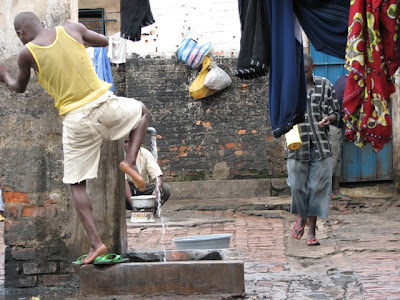The crime rate here jumps at this time of year because people are desperate to provide something extra to meet their families' expectations of new clothes and good food on the table. There aren't really any signs of Christmas in the same way you see lights and other decorations in the over-developed world. My favourite local restaurant, Gerda's, (run by a Belgian woman and mentioned in a previous post, March 2006) however is all lit up with fairy lights, Christmassy table mats, a well-decorated tree, red glass baubles and tiny shiny stars swimming in glass bowls on the tables, and a special menu with Coquilles St. Jacques - a delicious addition to an already pretty good menu.
People in North Kivu won't have much to celebrate this year, with hundreds of children being forcibly recruited into the various armed groups who even take children from schools and IDP camps. An estimated 800,000 people are now internally displaced in North Kivu: equivalent to the entire population of East Timor when I lived there in 1997. Fighting goes on. The BBC website (http://news.bbc.co.uk/) has been providing decent coverage of the war, and the recent visit by the head of UN High Commission for Refugees also brought the crisis to the world's attention for a few seconds for those who were tuned in at the right time. The city of Goma appears to be relatively safe and the residents calm, which allowed us to send two of our team this week for a monitoring visit, to see how staff trained last month to work with children in the camps are progressing.
Work slows down considerably for most of us during this time, and I'll be taking two weeks off. First stop is Kigali where I'm looking forward to spending time with good friends, and after that I'll be at the inviting Shaanti Holistic Health Retreat (http://www.shaantihhr.com/) on the Kenyan coast near Mombasa for a week. They offer special rates for those of us working in Africa, and I'm hoping that meditation and yoga twice a day will restore some of my sanity. This is a crazy world where so much luxury and so much poverty exist side by side. I'm grateful for the opportunities to be aware of both and to have the freedom to move from one world to the other. Most people are trapped by circumstances totally beyond their control.
Before I go, a few more photos to show you how beautiful it is here (yet another contrast: the beauty, the poverty, the violence...North Kivu is even more beautiful than South Kivu, where I'm located).

Daybreak over Bagira: Bagira is a suburb of Bukavu, purpose built for government workers by the Belgian colonial government in the '50s.

Taken from the second-floor of the house where I live, near the lake shore. This one looks straight across at Mount Kahuzi and the Kahuzi-Biega National Park, home to some of the few remaining mountain gorilla families. The small buildings on the opposite shore is the MONUC camp for the Uruguayan and Chinese military who patrol the lake. The international border between DR Congo and Rwanda runs the length of Lake Kivu and Congo is sensitive to the possibility of infiltrations by Rwandan military.

My favourite: a rare good sunset over Lake Kivu.








